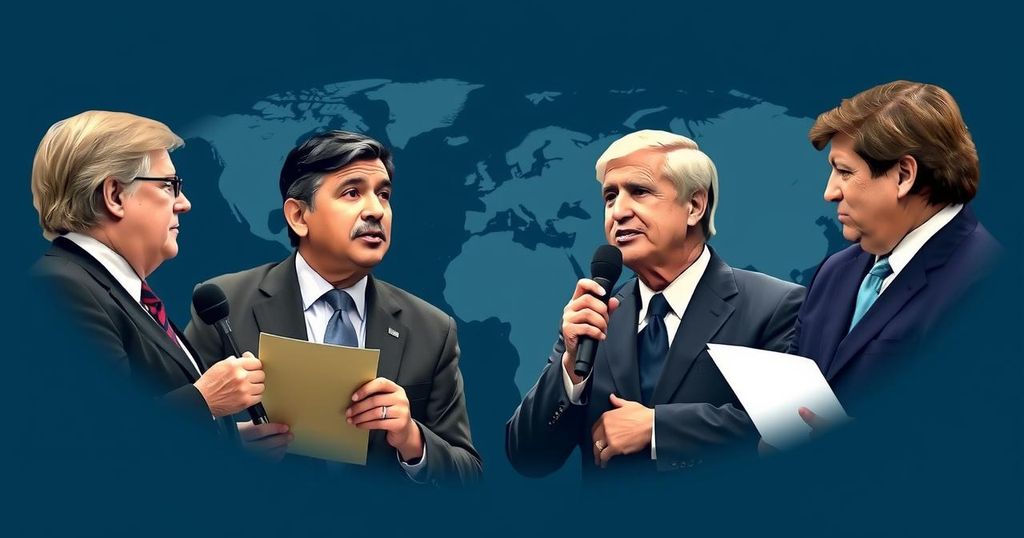U.S. Presidential Candidates Align with Global Shift Rightward on Immigration
U.S. presidential candidates are increasingly adopting rightward shifts in immigration policy, mirroring a global trend. Donald Trump articulates a fearful view of immigration as a crisis, while Kamala Harris has committed to reinforcing immigration restrictions. This evolution reflects a normalization of previously fringe policies across the political spectrum, raising concerns about the future of asylum rights and the humanitarian obligations of the U.S.
The landscape of U.S. presidential candidates is increasingly reflective of a global shift toward stricter immigration policies, as evidenced by the rhetoric and proposals from both former President Donald Trump and Vice President Kamala Harris. Trump has consistently framed immigration as a crisis, characterizing it as an invasion that warrants the largest deportation operation in U.S. history. He has declared intentions to significantly tighten border security by halting illegal immigration, claiming that undocumented individuals are violent criminals threatening American safety. Similarly, Harris’s campaign has indicated a readiness to embrace restrictive immigration measures. Despite traditionally liberal stances, she has expressed intentions to augment border enforcement and impose limitations that may conflict with international asylum rights. The mainstreaming of hardline immigration views marks a significant shift from previous decades, with scholars and rights advocates suggesting that policies once deemed extreme are increasingly normalized. Notably, historical references to similar political rhetoric include 1992 Republican candidate Pat Buchanan’s claims of an ‘illegal invasion’ at the U.S.-Mexico border. Global trends also reinforce this occurrence, as demonstrated by rising far-right political parties in Europe, which have adopted stringent anti-immigration platforms and garnered substantial electoral support. In the context of U.S. politics, an October survey indicated that immigration is a primary concern among voters, second only to inflation. The Biden administration, once positioned as a progressive alternative to Trump-era policies, has also been criticized for mirroring restrictive immigration measures. Harris, following Biden’s lead, has made commitments to enhance border security and impose legal barriers on asylum applications, reflecting a broader trend among both major political parties toward adopting tougher stances on immigration in response to the far-right’s influence. The escalating focus on immigration by both liberal and conservative candidates denotes a substantial transformation within the political discourse. This evolution carries significant implications for asylum rights and the character of U.S. immigration policy, suggesting a need for a more nuanced conversation surrounding the benefits of immigration and the ethical obligations toward refugees. This concerning trend elicits fear that essential humanitarian frameworks may be overshadowed by burgeoning populist narratives, which often exploit societal anxieties surrounding economic instability and national security in relation to immigration.
The dynamics surrounding immigration policy are at a pivotal intersection of U.S. domestic politics and global trends. The growing influence of far-right sentiment has led to a pronounced shift in both liberal and conservative parties towards more restrictive stances on immigration. This shift has not only altered rhetoric but has also impacted legislative proposals, particularly as immigration continues to be a pivotal issue during election cycles. Historical context shows that fear-based narratives concerning immigration have been leveraged for political gain, making the current climate increasingly relevant for voters and policymakers alike. Moreover, international trends in European politics, characterized by the rise of nativist parties, illustrate a shared global phenomenon where immigration is a foundational issue eliciting strong responses across the political spectrum. Such shifts raise important questions about the future of asylum rights and humanitarian responsibilities in the face of burgeoning immigration fears.
In conclusion, the U.S. political landscape’s response to immigration reveals a worrying trend where both major political parties gravitate towards more restrictive policies, influenced by a global rise in far-right ideologies. As both Trump and Harris navigate this contentious issue, the implications for asylum rights and the narrative surrounding immigration continue to evolve. The fundamental need for a more compassionate discourse that recognizes the advantages of diverse immigrant contributions and the moral imperatives of asylum must not be overshadowed by politically expedient narratives focused solely on border security and fear.
Original Source: www.aljazeera.com




Post Comment